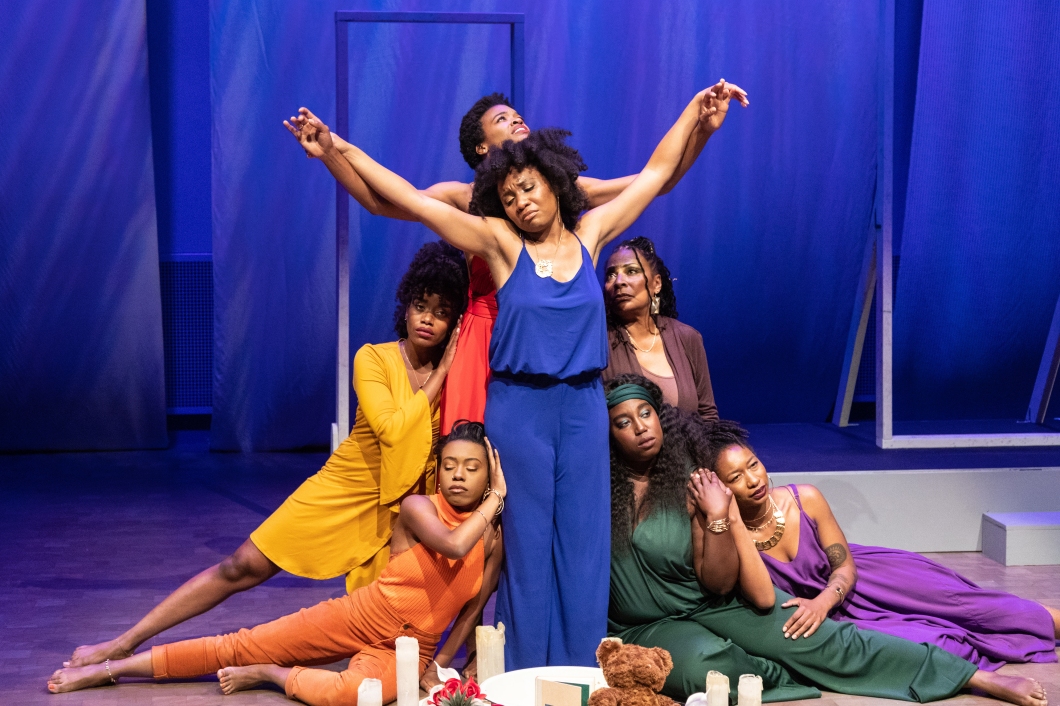
When Brittany Sims walks into the rehearsal room of her latest show, it feels different.
Sims did not grow up with reaffirming hashtags such as “Me Too” and “Black Girl Magic.” For Sims, it wasn’t uncommon to internalize her struggles as a young woman. But now, a seminal work in the hands of the women of the African-American Shakespeare Company hopes to further illuminate the beauty and complexities of the black woman.
“For Colored Girls Who Have Considered Suicide When the Rainbow is Enuf,” written by Ntozake Shange, is a seminal work in both theatre and literature circles, first premiering in New York in 1976. The play looks at the issues of seven women and their dealings with a racist and oppressive society, women who are nameless and only known by the color they are assigned. The play’s mediums are many, with Shange coining the phrase “choreopoem” as a way to describe the work, which uses equal parts music, dance, drama and poetry. It is running at the Taube Atrium Theatre in San Francisco through Sept. 29th.
The 28-year-old Sims is fortunate to play her favorite character in the play, the Lady in Green. She read the play as an undergraduate student at Sacramento State, and it had a tremendous impact on her. Now, as someone tasked to reveal the play’s universe to an audience, she is relishing every opportunity she has to share that impact.
“Honestly, the play for me is a very transforming, releasing experience, and there’s something so special about being a part of an African-American all-female cast, which normally doesn’t happen” said Sims. “It’s such an amazing experience to say to each other, ‘Let’s talk about this,’ and ‘Let’s be open.’ These women lift me up to get through the night, which is amazing.”
Director Elizabeth Carter was only a 15-year-old theatre kid in high school the first time she heard the play, and like Sims, it had a long-lasting impact.
“I loved poetry at the time too and loved that kind of language, and the play got to something very deep and specific within me which was entirely literal,” said Carter. “It was incredible getting to hear a black woman speak about being a black woman from a very internal place.”
That certainly includes struggles and pain, but it also means so much more.
“Now we have the term ‘black girl magic,’ which was not a thing then,” said Carter. “It existed but it wasn’t something in people’s consciousness. As black women, we can have struggles, but we can also have immense joy, power and light, pain and sorrow, and those things can be intertwined in such a deep and inseparable way.
“There was a time where you had to pick being a woman of your race, but now it’s about seeing the wholeness of us as people and as women.”
Revealing that wholeness is one thing that Sims hopes the show will accomplish.
“I hope the audience learns that with being a black woman, we go through things you may never know,” said Sims. “Being a black woman doesn’t mean just being angry. There are so many layers to a black woman. We are strong mothers, fierce warriors and so much more than what you see on television.”
Sims certainly had rough days going into rehearsal, but found joy and comfort being amongst other black women who empathized with her constantly. Tears of joy and pain filled her days with her fellow artists. Sharing those internal struggles in a safe place gave her strength, and she is hopeful others can receive that same strength.
“I hope that as African-American women, we can communicate and talk about the hard times, not just talk about the good times,” said Sims. “If we are going through something, we need to go to counseling and see a therapist. Getting help doesn’t make you weak.
“With this piece we are all helping each other. We carry so many burdens as African-American women, and we reach a point where we break and can’t take it anymore. But for me, through rehearsal, and it took so many years to say this, I feel a strong burden lifted from me.”
Carter believes the show creates a communal experience, one that provides strength in numbers.
“The show is a symphony of experiences using different voices,” said Carter. “We have a connective tissue with other women, and we have created the sense that we are only alone when we are supposed to be alone. It’s a place to lay down your story.
“I feel very blessed, honored and lucky to be in a room with so many black women – it’s just a gift, it really is, and hopefully it translates to everyone else.”
WHAT TO KNOW IF YOU GO
African-American Shakespeare Company presents “For Colored Girls Who Have Considered Suicide When the Rainbow is Enuf”
Written by Ntozake Shange
Directed by Elizabeth Carter
Taube Atrium Theatre
401 Van Ness Avenue, San Francisco
Tickets – $35
For tickets, visit https://www.african-americanshakes.org/

